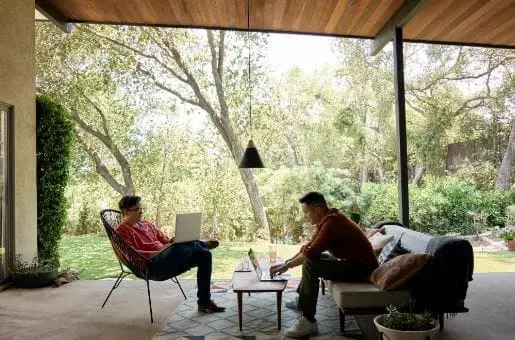The largest 4-day working week trial started this month with 70 UK companies taking part across a range of sectors. The pilot, organised by the 4 Day Week Global campaign group, is following the 100:80:100 model, whereby employees get 100% of pay, for 80% of time, at 100% of productivity.
Offering workers flexibility and a better work/life balance has arguably never been more important. With the number of job vacancies reaching record highs and soaring inflation meaning many employers aren’t able to raise wages to keep up, the competition for candidates is on.
The timing is apt, too. We are now 5 months on from the government’s final ‘return to work’ order and businesses are considering what the future of work looks like. The pandemic flipped working routines as well as accelerating trends that were already in play, which has paved the way for a new model of work to be defined.
Here, we will look at 4 trends that we believe will prevail from the pandemic, what this means for brands and how they need to adapt.
1. From work from home to work from anywhere?
Workers were quick to adapt, and quick to feel the benefits, when their homes became their workplace overnight in March 2020. Mintel research shows an overwhelmingly positive feeling towards working from home, particularly among those workers who are doing it for some or all of their week. Aside from the obvious benefits of flexibility and cutting the commute, productivity when working remotely doesn’t seem to waiver. Over a third of workers associate working from home with being productive, the same as when thinking about working out of the home.
While some companies have tried to get their workers back into the office 5 days a week, most have embraced a hybrid approach where possible. A smaller number of companies, like AirBnb, DropBox and Shopify, have moved forward with full-time, permanent remote working policies, something we will see more of in the future alongside specific in-person events organised for collaboration throughout the year.
For employers, ‘work from anywhere’ policies will mean they have to trust their employees and be open-minded in how they define what productive work looks like. They will feel the benefits from more diverse recruitment of skills and people, with someone’s location not restricting their chances of employment.
Source: Airbnb. Airbnb co-founder and CEO Brian Chesky told employees that the right solution to the business of human connection “should combine the best of the digital world and the best of the physical world”.
The shift away from the workplace in the long-term will impact consumers’ daily interactions with brands in a myriad of ways – from where they eat, how they exercise and where they shop …leading to a shift in retail, hospitality and leisure needs around their home. There will be further opportunities for local gyms, convenience stores and food service in towns and villages. While in cities, there will be a need for physical spaces for colleagues to come together, collaborate and be creative.
Homeware and furniture brands can tap into this by providing workers with comfortable and flexible workspaces at home for the long-term. For example, modular and mobile workspaces that can be easily re-assembled to fit altering work needs, and moved around the home for a change in environment. Technology brands that provide online platforms and tools to connect colleagues and allow for efficient collaboration across time zones will be necessary as colleagues relocate across the globe.
2. Flexibility wherever possible
Flexible hours were the employee initiative of most interest to workers when asked recently, above a good pension scheme and the ability to work from home.
But, it’s important to recognise that flexibility doesn’t just mean remote working, or even flexible start and finish times. It’s about giving employees autonomy and the ability to self-manage, allowing workers to structure their working life to suit them. This could mean choosing working hours, and breaks, to match optimal productivity levels throughout the day. As long as the employee is productive, they will be able to work as they please in the future.
Brands that can help employees navigate the new era of flexible working will be valued. There are opportunities for health apps that track a person’s daily body cycles to help them understand how lifestyle and physiological factors impact productivity levels. Workers can then find when they are at their most productive, and when is best to take a break, to make the most of their time and flexible schedule.
Source: Getty Images. In a time where employers are competing for candidates, offering flexibility, wherever possible within a role, will likely be the means to do so.
3. An even greater focus on work/life balance
The pandemic caused people to reassess their priorities and what they look for in a job. And now, 3 in 10 workers likely to look for a new job in the next year are looking to improve their work/life balance, above progressing in their career or finding greater job security.
Flexible working, and the potential 4-day working week, should cater well to a better work/life balance. First though, businesses will need to figure out smarter working practices to avoid employees working overtime to keep up.
Whilst at work, health and fitness brands can step in to improve the wellbeing experience of employees. Free fitness classes within working hours and on-site mental health support can help reduce feelings of stress and burn out, just like Sweaty Betty’s Reclaim your Lunchbreak campaign, which organises lunchtime yoga classes or running clubs for employees.
More importantly though, the problem of burn out needs to be solved at the core – by managing workloads and fostering a culture of openness where employees can speak up when they are overwhelmed and push back on unrealistic expectations.
4. Digital exhaustion is real
The adoption of new technologies and communication channels was immediately successful in connecting colleagues and facilitating remote working during the pandemic. But, as time has gone on, employees are becoming digitally exhausted, with many of their interactions moving online from work meetings and doctors’ appointments to virtual concerts and social events.
Source: Getty Images. While remote working looks to be a new norm, relationship building in person is still important for employees.
The future of remote working looks strong, and while workers don’t want to commute to the office 5 days a week, many will still want to come together to socialise and build relationships. This is important for leisure, foodservice and hospitality brands within city centres. They can partner with businesses to offer workplace deals and position themselves as the ideal opportunity to bring colleagues together and to connect outside of work.
What we think
For many workers, working lifestyles have shifted more than could have been imagined over the past two years. Workers are rejecting the rigid 9-5, 5 days a week routine, and instead are prioritising flexibility, autonomy and a better work/life balance (with a side of socialising with colleagues in-real-life). These changes will prevail in the long-term and have set businesses up well to embrace further flexible working, including the 4-day working week.
Brands from multiple sectors will have to re-think their interactions and relationships with consumers as their working lives become more fluid.
































